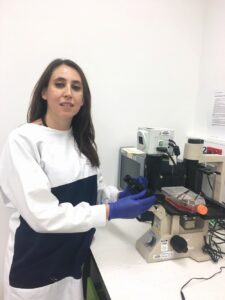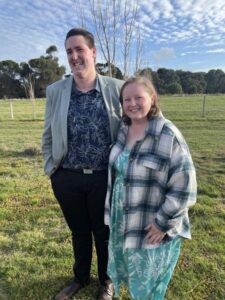You’re powering research that will change lives
Bold research needs bold support, and that’s exactly what your generosity is giving.

For Dr Ilaria Pagani, an internationally recognised young leader in chronic myeloid leukaemia (CML) research, the future for Australians with CML will be one with a cure.
It’s an ambitious goal, but it’s one she’s passionate about.
“CML is fatal if untreated. My research program aims to convert CML treatment from lifelong disease control to cure,” says Dr Pagani.
And thanks to your support, Leukaemia Foundation funding of $400,000 is helping Dr Pagani get closer to that bold end goal.
Improving life for Australians with CML
Today’s standard treatment for CML is a lifelong treatment with tyrosine kinase inhibitors (TKI). Wonderfully, TKI has drastically increased CML survival rates to over 80%.
However, being dependent on lifelong treatment is expensive and can hugely impact someone with CML.
“It can lead to an impaired quality of life, severe toxicities and a cumulative risk of organ damage,” explains Dr Pagani.
Currently, for people who achieve remission on TKI treatment, only 25% can stop treatment and remain in remission. This is called treatment-free remission.
Ultimately, treatment-free remission is the best outcome for people living with CML to avoid side effects and other challenges such as expensive medications.
Dr Pagani’s research is trying to achieve this outcome for all people with CML.
A game-changing test
Backed by your contributions, Dr Pagani is developing a test using biomarkers to predict which patients are most likely to be able to come off treatment and stay in remission.
“My vision is not only to identify patients who can safely cease their TKI, but also to offer new therapies for patients with a predicted worst outcome,” explains Dr Pagani.
Importantly, your support will help accelerate the test development to become part of routine clinical practice in the next five years.

Annie Dunn was diagnosed with CML when she was 21 and has been on TKI treatment ever since. Some days are good; others are challenging.
“I have had side effects ranging from body aches, vomiting, diarrhoea, brain fog, fatigue and nausea. I hate them. They hit me at any time,” says Annie.
“There are times when I can afford treatment but other times it’s hard. With the cost of living now, it’s really hard.”
“I’m thankful for the treatment, but I feel I have lost my 20s to this illness and having to be on TKI.”
For Annie, the idea of having a test to help predict if she could safely achieve treatment-free remission is huge.
“I don’t even know if I have the words to describe how fantastic that would be,” she says.
Thank you so much
Annie’s so grateful to caring people like you who are funding Dr Pagani’s groundbreaking research.
“I deeply and wholeheartedly want to say a big fat thank you. You make the world of difference in our lives.”